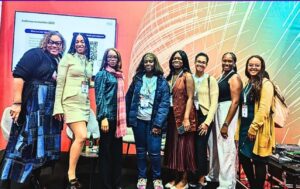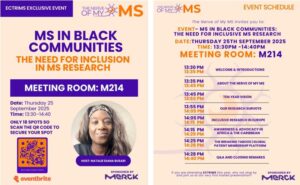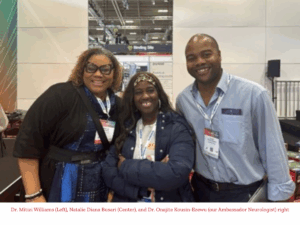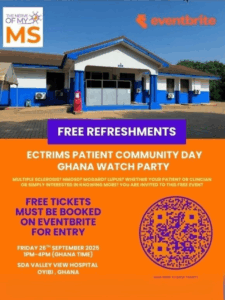We are The Nerve of My Multiple Sclerosis, a nonprofit Patient Organisation based in the UK, and one of the Official Supporters of ECTRIMS Patient Community Day.

Last year was the first time our organisation attended and took part in ECTRIMS in Denmark. We went hoping to connect with like-minded individuals, but what we found was even stronger than expected: real interest, meaningful conversations, new friendships and important professional connections. This year, we’re returning with hope to reconnect with old friends and meet many more.
Why does this matter?
It is no secret that people of Black heritage are under‑represented at medical conferences such as ECTRIMS — not only among patients, but among researchers and clinicians too. Representation matters because a lack of representation affects research priorities, clinical recognition and outcomes for people with MS.
We were proud to bring our Ambassador Neurologist last year — the only Black Neurologist in the UK & Ireland who specialises in MS — and to meet the amazing Dr Mitzi Williams and her team, which gave a warm feeling of black representation and the need for more, especially in Europe.
What we know — and what we’re seeing
• There is limited Europe‑based research focused on people of Black heritage, yet international studies suggest different triggers, disease courses and outcomes can affect this community.
• Within our community, we observe later diagnoses, faster progression and earlier disability — signs that early symptoms are being missed or not recognised promptly by medical professionals.
• This is not simply an issue of awareness; it is an issue of equity in research, care pathways and clinical trials.
If early signs are not recognised, how can people in the black community be helped?
If clinicians do not recognise early signs of MS in Black patients, timely treatment is delayed and opportunities to slow progression can be missed.
That raises several critical problems:
• Later diagnosis often means treatment is started when disease activity has already caused more damage.
• Faster progression and earlier disability in Black patients may be partly explained by diagnostic delay and a lack of tailored clinical pathways.
• Without data that reflects the experiences of Black patients, clinicians have less evidence to guide early recognition, monitoring, and treatment decisions for this group.
Reducing rapid progression in the black MS Communities— what needs to change?
More research focused on Black people with MS will help clinicians recognise early symptoms and understand differences in disease course. To reduce rapid progression, we need:
• Studies that include enough Black patients ensure that results are meaningful for the community.
• Clinical training and guidelines that cover how MS can present in different ethnic groups.
• Earlier access to specialist assessment and diagnostic testing for people from underrepresented groups.
• Personalised care approaches, rather than one-size-fits-all models — tailoring monitoring, treatment choices, and support to the individual.
• Enhanced community engagement enables patients to feel confident speaking up about symptoms and seeking care early.
Our message:
Inclusion must be meaningful and prioritised. The Black MS community cannot be treated as an add‑on or generalised within broad categories. Generalisation is damaging, as it risks masking differences in early presentation, disease progression, and treatment response. Inclusion must be personalised, intentional and made a priority across European MS research and care.
What we’re doing at ECTRIMS 2025 raises the spotlight on MS in Black communities:
1) We are hosting a short in-person event, details below:
 Event: “MS in Black communities — The need for inclusion in MS research”
Event: “MS in Black communities — The need for inclusion in MS research”
Date: Thursday, 25 September 2025
Time: 13:30–14:40
Location: Meeting Room M214
Format: In-person session (limited to approximately 18 tickets). Everyone in attendance at the conference is invited, but the event will only be open to those who have booked a free ticket on the event’s Eventbrite page.
2) We will be exhibiting at the Nonprofit Organisation (NPO) village at BOOTH N21, so come and stop by when you have the chance.
 How can you help?
How can you help?
• Attend the session in person: limited seats are available, so register early.
• Share this event with colleagues, patients and researchers who care about equity in MS research and care.
• Partner with Us
• Donate to our causes
• Collaborate with us
• If you are a Researcher or clinician, consider how your work can include diverse populations, from trial recruitment to symptom recognition and analysis.
• Ask questions, speak up and demand personalised approaches to diagnosis and care for people from under‑represented groups.
We are committed to pushing for real change: more research, earlier recognition, better care pathways and a place at the table for Black people affected by MS across Europe. The disadvantage facing the Black MS community is clear — and only a focused, personalised approach in research and clinical care will begin to close that gap. This Patient Community Day is an important step — please join us and help make diversity and inclusion a priority in MS Research.
3) We have organised a Patient Community Day Watch Party

We’re delighted to announce the first-ever MS watch party in Ghana, organised by our Ambassador Jennifer Mingle and taking place at a local hospital.
The event — the first of its kind in the country — will include refreshments and opportunities to network with patients, carers and health professionals, and is open to anyone interested. It aims to raise awareness of multiple sclerosis and related autoimmune conditions in a country where understanding of these illnesses remains limited. We are also pleased to confirm that My MS Ghana has been officially registered
as an NGO branch, and we look forward to delivering more awareness-raising activities and support across Ghana.
Blog courtesy of The Nerve of My MS, a Patient Community Day Supporting Partner.


